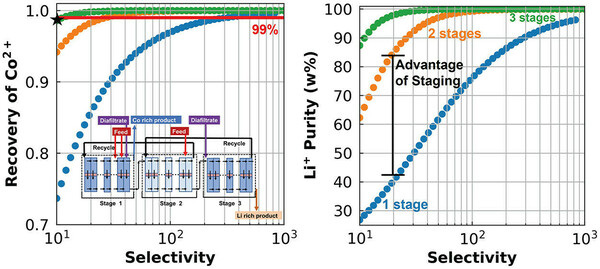
We are excited to share our paper, Optimal Diafiltration Membrane Cascades Enable Green Recycling of Spent Lithium-Ion Batteries, is now available in ACS Sustainable Chemistry & Engineering.
Abstract: Novel processes are urgently needed to recycle critical materials (e.g., cobalt, lithium, nickel, and manganese) from spent lithium-ion batteries (LIBs). These separations are vital both to meet growing global demand and to mitigate a looming e-waste crisis. Currently, to recover cobalt and lithium from spent LIBs, high temperatures and organic solvents are used to separate Co2+ and Li+ in complex leaching and extraction processes. In contrast to using expensive designer ligands or harmful organic solvents, this work reveals that continuous membrane cascades are a promising aqueous-based alternative to recover these critical materials and facilitate their reuse. A superstructure optimization model that designs diafiltration cascades to maximize material recovery and purity as a function of membrane material performance and feed specifications is developed. This approach enables the comparison of candidate membrane materials by rapidly predicting the Pareto optimal trade-offs between the recovery and purity of lithium and cobalt for bespoke cascade designs. For example, the model predicts that, when deployed in an optimized two-stage cascade configuration, a nanofiltration membrane with a modest selectivity of 32 can be used to recover 95% Li+ and 99% Co2+ at 93 and 99.5 wt % purity, respectively. On the basis of analysis of over 1000 Pareto optimal designs, six design heuristics for executing binary separations using staged diafiltration cascades are proposed. Moreover, by evaluating membrane materials in the context of optimized diafiltration processes, this work quantifies the benefits of materials improvements and shows that the greatest research opportunities for membrane-based LIB recycling are at the device and systems scales. More broadly, the optimization models represent a robust framework for identifying the most effective way to deploy emerging materials in integrated process systems. This transformative capability is widely applicable to many of the separations needed to support sustainable global development.
Originally published by at dowlinglab.nd.edu on September 09, 2022.